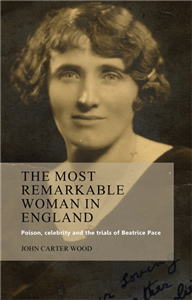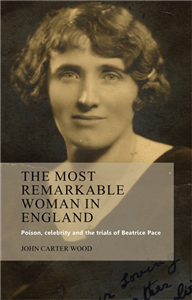The most remarkable woman in England
Poison, celebrity and the trials of Beatrice Pace
by John Wood
This book offers the first in-depth study of one of the most gripping trials of inter-war Britain, that of farmer's wife Beatrice Pace for the arsenic murder of her husband. A riveting tale from the golden age of press sensationalism, the book offers insights into the era's justice system, gender debates and celebrity culture. Based on extensive research, it locates the Pace saga in the vibrant world of 1920s press reporting and illuminates a forgotten chapter in the history of civil liberties by considering the debates the case raised about police powers and the legal system. Spanning settings from the Pace's lonely cottage in the Forest of Dean to the House of Commons and using sources ranging from meticulous detective reports to heartfelt admirers' letters, The most remarkable woman in England combines serious scholarship with vivid storytelling to bring to life the extraordinary lives of ordinary people between the wars.









